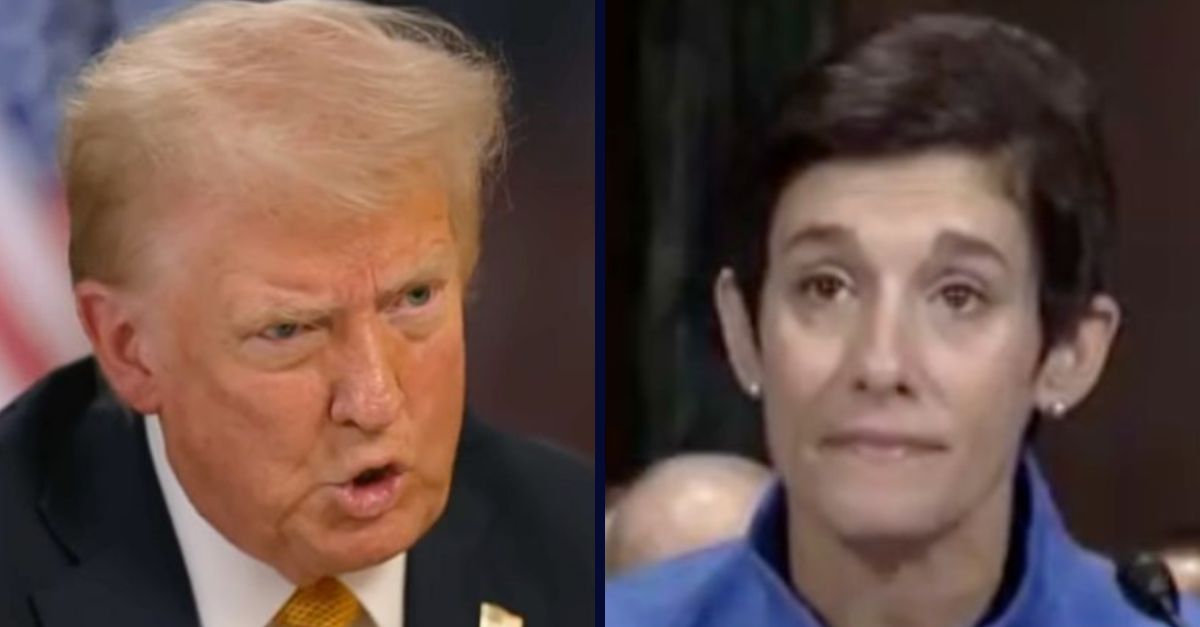
Left: President-elect Donald Trump on “Meet the Press” Sunday, Dec. 8, 2024 (NBC News/YouTube). Right: U.S. District Judge Paula Xinis attends her nomination hearing before the U.S. Senate on July 22, 2015 (Senate Judiciary Committee).
Fed up with the government’s “gamesmanship” and “grandstanding” over the Kilmar Abrego Garcia deportation case, a federal judge in Maryland tore into the Trump administration on Tuesday afternoon following yet another nose-thumbing by the Justice Department in court filings — with DOJ lawyers and administration officials being blasted for not providing proper updates and blatantly ignoring judicial orders related to the deported dad’s situation.
“We’re going to do this by the federal rules of civil procedure,” U.S. District Judge Paula Xinis told Deputy Assistant Attorney General for Immigration Litigation Drew Ensign and the court Tuesday at a highly-anticipated hearing on Abrego Garcia’s deportation saga, according to Politico reporter Kyle Cheney, who was in attendance.
“No press release is going to move the court the same way that sworn, under oath testimony from persons with knowledge,” Xinis said. “If you have objections, you’re going to have to make them consistent with the rules.”
Noting how she wanted to “move” things forward quickly, Xinis scolded Ensign and the DOJ for not providing proper updates on Abrego Garcia’s location, his mental and physical health condition and what steps are being taken to bring him back.
The Trump administration dug in its heels earlier in the day, defiantly telling Xinis in a court declaration that even if Abrego Garcia were to be returned to the U.S. somehow — after he was mistakenly deported to a terrorist prison in El Salvador — he would be swiftly detained and removed again upon his arrival. An attorney for the Department of Homeland Security filed the sworn declaration minutes before Tuesday’s afternoon hearing began.
“If Abrego Garcia does present at a port of entry, he would become subject to detention by DHS,” the declaration states. “In that case, DHS would take him into custody in the United States and either remove him to a third country or terminate his withholding of removal because of his membership in MS-13, a designated foreign terrorist organization, and remove him to El Salvador.”
The administration’s declaration was filed shortly after an attorney for Abrego Garcia — a native of El Salvador who was in the U.S. with protected legal status at the time of his deportation — accused the DOJ of flouting orders from the U.S. Supreme Court and Xinis instructing the government to return Abrego Garcia to the United States. The three-page filing alleges that Trump administration officials have been intentionally misconstruing court orders since Abrego Garcia, whose wife and child are both U.S. citizens, was deported in “error” in March under President Donald Trump’s unprecedented use of the Alien Enemies Act of 1798 (AEA), a wartime authority only previously invoked three times, the last of which was during World War II.
More from Law&Crime: ‘DHS would take him’: Trump admin doubles down on barring wrongly deported dad’s return as attorneys allege president is ignoring SCOTUS order
Specifically, the filing focuses on the government’s interpretation of the word “facilitate” in orders from both the Supreme Court and Xinis.
Last Thursday, the high court largely upheld Xinis’ prior order requiring the Trump administration to “facilitate” Abrego Garcia’s release from the Salvadoran work prison. Xinis subsequently ordered the DOJ to inform her on Abrego Garcia’s current status and the steps the DOJ has taken and plans to take to “facilitate” his return to the U.S., but the Trump administration has been outwardly defiant, repeatedly stonewalling the court with daily updates that provide Xinis with little to none of the information requested.
“There will be no tolerance for gamesmanship or grandstanding,” Xinis declared Tuesday at the hearing.
“Cancel vacations, cancel other appointments,” she said. “I’m usually pretty good about that … Not this time. I will be flexible if you need to accommodate [depositions] in the courthouse. I’m going to be available if you need to do it at odd hours or weekends. That’s what I’m talking about.”
Xinis argued, according to Cheney and other reporters in attendance Tuesday, that every day Abrego Garcia is locked away in El Salvador is “a day of further irreparable harm” for him and his family. Abrego Garcia’s wife was at the federal courthouse in Greenbelt, Maryland, where protesters reportedly gathered to voice their support for him.
“Kilmar, if you can hear me, stay strong,” the man’s wife, Jennifer Vasquez Sura, said outside the courthouse, according to New York Magazine’s Intelligencer outlet.
“God hasn’t forgotten about you,” Sura added. “Our children are asking when will you come home and I pray for the day that I tell them the time and date that you’ll return.”
Describing the government’s response, Sura said: “This administration has already taken so much from my children, from Kilmar’s mother, brother, sisters and me.”
President Trump on Saturday evening stated that the fate of Abrego Garcia and all of the “barbarians” deported without due process through the AEA was up to El Salvador’s president, Nayib Bukele.
On Monday, Trump met with Bukele at the White House and took questions about Abrego Garcia’s situation, per NPR.
Both he and Bukele tried claiming that their country’s hands were tied when pressed by reporters about why Abrego Garcia couldn’t be brought back to the United States.
“The question is preposterous,” Bukele said. “How can I smuggle a terrorist into the United States? I don’t have the power to return him to the United States.”
Asked why the U.S. wasn’t complying with the Supreme Court’s order, Trump told CNN’s Kaitlan Collins: “How long do we have to answer this question? Why don’t you just say, ‘Isn’t it wonderful that we’re keeping criminals out of our country?’ Why can’t you just say that?”
Xinis said Tuesday that the comments between the two presidents in the Oval Office were not a “nonresponsive answer” to her questions.
“If that were in a court of law — it would have real infirmities in a trial, in a court of law,” the judge explained, per Cheney.
“It is not a direct response, nor is the quip about smuggling someone into the United States,” she said. If the government were “facilitating” his return, Xinis asserted that there would be no “smuggling” going on.
“When a wrongfully removed individual [is outside U.S. borders] it’s not so cut-and-dried that all you have to do is remove obstacles domestically,” Xinis reportedly told the DOJ.
The judge said there would be “two weeks of intensive discovery” to come in the case and that it was time for the Trump administration to accept defeat and move on.
“You made your jurisdictional arguments, you made your venue arguments,” Xinis said, according to Cheney. “You made your arguments on the merits. You lost. This is now about the scope of the remedy.”
Love true crime? Sign up for our newsletter, The Law&Crime Docket, to get the latest real-life crime stories delivered right to your inbox.
Jerry Lambe contributed to this report.



